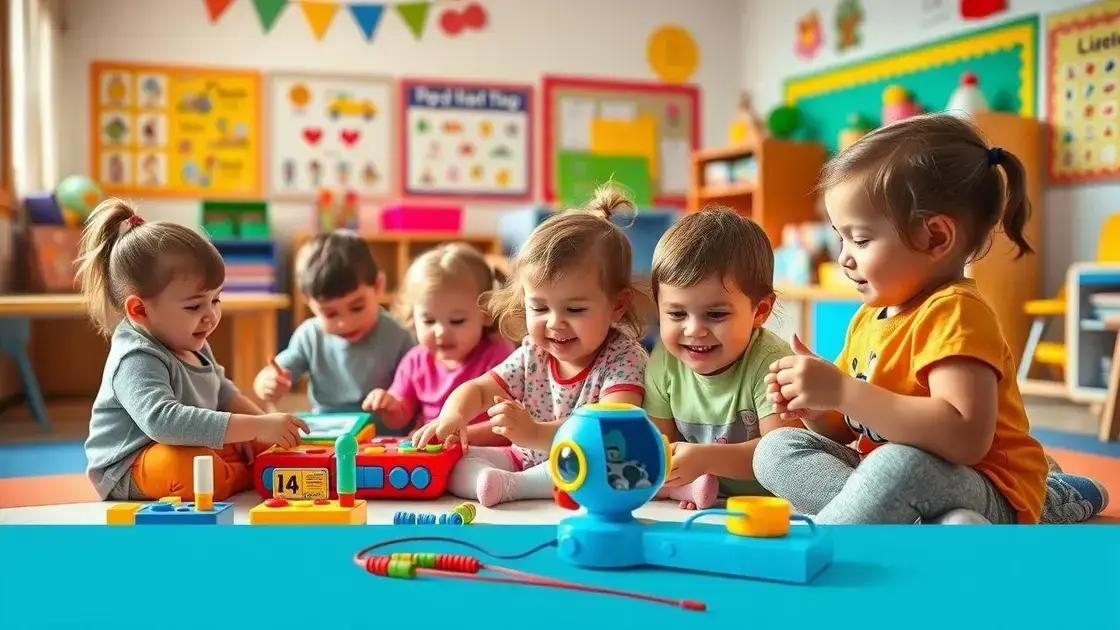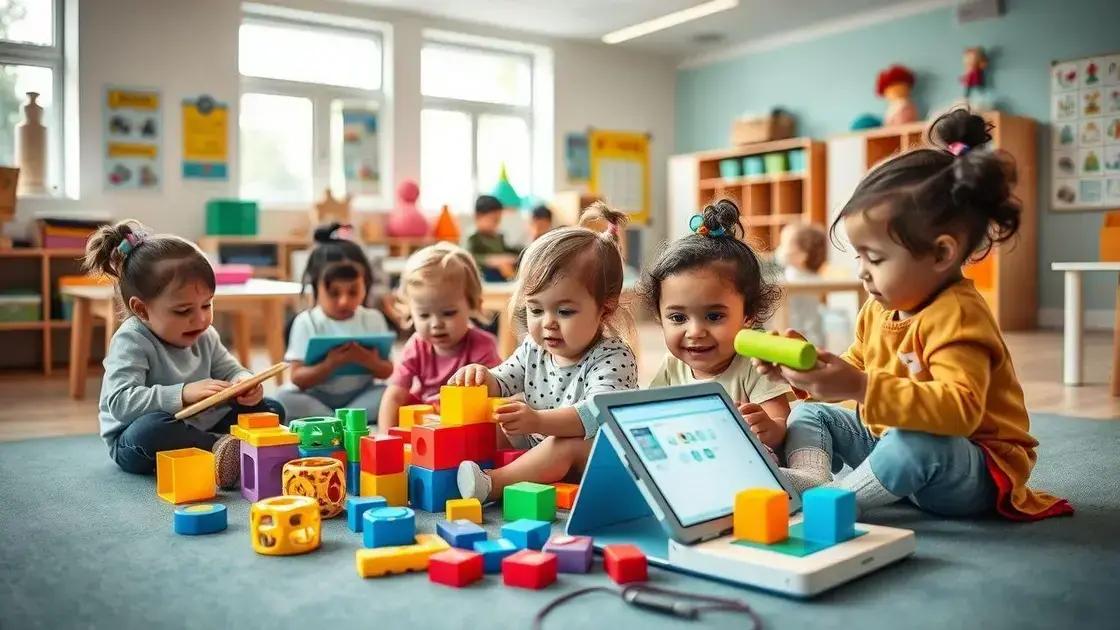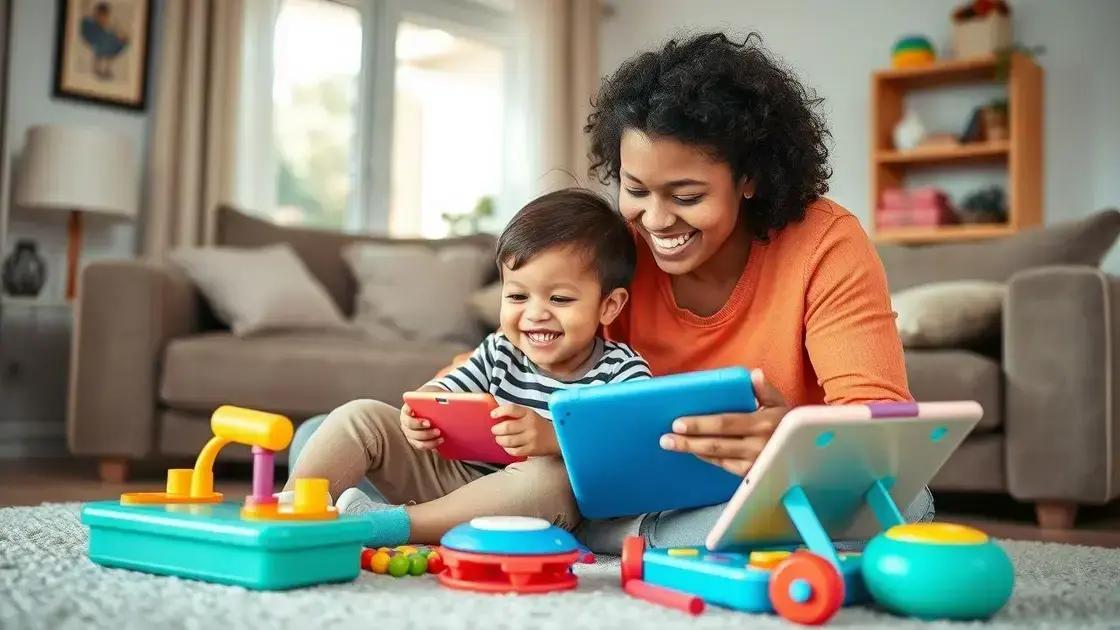Early coding programs for toddlers: setting the foundation

Early coding programs for toddlers foster essential skills by using engaging, play-based methods that introduce coding concepts through interactive apps and toys.
Have you ever thought about how important it is for toddlers to learn coding skills? Early coding programs for toddlers are a fantastic way to introduce young minds to the world of technology, problem-solving, and creativity. This article dives into the benefits and resources available for your little ones.
Why coding matters from a young age
Understanding why coding matters from a young age is crucial for nurturing future innovators. Early coding programs for toddlers help instill essential skills and build a strong foundation in technology. By learning to code, children develop logical thinking, creativity, and problem-solving abilities, all of which are vital in today’s digital world.
Benefits of learning coding early
Introducing coding at an early age opens up a world of opportunities. Here are some key benefits:
- Enhances critical thinking: Coding teaches kids to break problems down into manageable parts, fostering analytical skills.
- Encourages creativity: Coding allows toddlers to create their own stories and games, making learning a fun experience.
- Improves collaboration: Code often involves teamwork, teaching toddlers how to work together and communicate effectively.
- Builds resilience: Learning to code helps children understand that mistakes are part of the learning process.
Furthermore, coding is increasingly becoming a part of everyday life. From the apps they use to the devices they play with, understanding the basics can empower children. It sparks their curiosity about how things work and motivates them to explore further.
Real-world applications
As children engage with early coding programs for toddlers, they also discover real-world applications of their skills. For instance, understanding coding concepts can enhance their experience with technology in various fields, such as education, entertainment, and art. Elementary concepts learned in these programs can lead to interest in robotics, game design, and more.
Incorporating coding into daily activities makes learning accessible and fun. Simple coding games and toys can capture a toddler’s attention while teaching them essential skills. This practical approach ensures that children are not just passive consumers of technology but active creators.
Thus, introducing coding at a young age lays the groundwork for a bright future. As they explore, create, and experiment, toddlers gain confidence and valuable skills that will serve them well in an ever-changing digital landscape.
Fun and engaging early coding programs

Engaging young minds in coding is both rewarding and fun. Fun and engaging early coding programs create interactive environments where toddlers can learn while playing. These programs use games and hands-on activities to teach foundational programming concepts in a delightful way.
Types of coding activities
There are various activities designed to make learning coding enjoyable. A few popular options include:
- Interactive coding games: These digital games provide a playful context for toddlers to practice coding concepts.
- Physical coding toys: Toys like coding robots allow children to control movements and build sequences, bridging the gap between physical play and digital logic.
- Story-based coding challenges: Engaging narratives inspired by favorite characters can motivate toddlers to solve problems through code.
- Group coding projects: Collaborative activities encourage teamwork and communication, making learning more social.
Each of these activities not only captivates children but also promotes STEM skills in a natural way. When kids see immediate responses from their actions, they gain a sense of accomplishment that boosts their confidence. This positive reinforcement plays a critical role in motivating them to explore more.
Benefits of playful learning
Learning through play is essential for young children. Playful coding activities enhance problem-solving abilities, sharpen critical thinking, and foster creativity. By experimenting with coding, toddlers develop a growth mindset. They learn that making mistakes is part of the learning process.
The integration of fun into coding is not just about entertainment; it’s a method of reinforcing complex skills in an accessible format. Programs that feature games typically allow for exploration at a child’s pace, which helps maintain their interest and encourages curiosity.
Moreover, getting captivated by coding from an early age can set the stage for lifelong interests in technology. Parents can support their toddlers by engaging in these activities together, thus reinforcing the learning experience and creating lasting memories.
Best resources for toddlers learning coding
Finding the right tools can make all the difference in a toddler’s coding journey. There are many best resources for toddlers learning coding that transform complex concepts into fun and interactive experiences. These resources can spark a child’s interest in technology and help them develop important skills.
Top coding apps
Several apps tailor their learning to young children. Some of these include:
- ScratchJr: This app allows toddlers to create their own interactive stories and games through block-based coding.
- CodeSpark Academy: Using engaging games, this platform teaches coding logic without needing to read.
- LightBot: A puzzle game that introduces kids to basic programming concepts through guiding a robot to light up tiles.
- Bee-Bot: An interactive app that pairs with a physical coding robot, teaching sequencing and problem-solving.
These apps are designed to captivate young children while educating them on the fundamentals of coding. They are user-friendly, allowing toddlers to navigate and explore without frustration.
Interactive coding toys
In addition to apps, there are amazing physical toys that help learn coding. These toys bridge the gap between digital and physical play. Examples include:
- Osmo Coding: This hands-on kit combines tangible blocks with digital gameplay to teach coding concepts.
- Kano Kit: With Kano, kids can build their own computers and learn coding through engaging challenges.
- Botley 2.0: A coding robot that encourages logic through fun tasks, perfect for teamwork.
These interactive toys encourage creativity and collaboration while allowing toddlers to see the direct results of their coding efforts. This blend of play and education solidifies their understanding of important coding concepts from a young age.
Moreover, many local libraries and community centers offer coding workshops specifically for young children. These hands-on classes provide a supportive environment where toddlers can learn with their peers. Parents can also extend learning at home by engaging with their kids in coding challenges or activities. This shared experience enhances their bonding and strengthens their interest in technology.
How to encourage your toddler’s coding skills

Encouraging your toddler’s coding skills can be a rewarding journey for both parents and children. Simple actions can inspire curiosity and sustain interest in technology. By creating a positive learning environment, you can nurture these skills effectively.
Start with play-based learning
Utilizing a play-based learning approach is essential. Engage your toddler with coding games that make learning fun. This method keeps the content light and enjoyable, which is crucial for early learners.
- Use coding apps: Interactive apps designed for toddlers can introduce coding in an appealing way.
- Incorporate coding toys: Toys like coding robots can make learning tactile and exciting.
- Organize playdates: Group activities can help toddlers learn through teamwork and shared experiences.
As they engage in play, they learn to problem-solve and think critically without even realizing it. This naturally fosters their coding skills, as they see direct results from their actions.
Model curiosity and exploration
Show enthusiasm for technology and coding yourself. When toddlers observe adults expressing interest, they are more likely to emulate that curiosity. Take time to explore coding concepts together. For instance, when you encounter a problem, talk through how you would solve it, demonstrating analytical thinking.
Moreover, provide opportunities for hands-on experiences. Take them to workshops or classes that focus on coding and technology. Being in a structured setting allows for focused learning while still being social and fun. Encourage questions about technology and coding, and explore the answers together, enhancing their understanding.
Finally, celebrate their accomplishments, no matter how small. Positive reinforcement will boost their confidence and motivate them to tackle more significant challenges. Each small victory is a building block for their skills. The key is to make learning enjoyable and pressure-free.
FAQ – Questions About Encouraging Coding Skills in Toddlers
What are some fun coding apps for toddlers?
Some popular coding apps include ScratchJr, CodeSpark Academy, and LightBot, which are designed to engage young children while teaching coding concepts.
How can I help my child learn coding at home?
You can use coding toys, interactive games, and coding apps. Engage in play-based learning activities together to make it enjoyable.
Why is play important in learning coding?
Play allows kids to explore and learn without pressure. It helps them develop problem-solving and critical thinking skills naturally.
What should I do if my child struggles with coding activities?
Be supportive and encourage them to ask questions. Celebrate small achievements to build their confidence and motivation.






